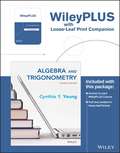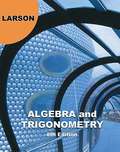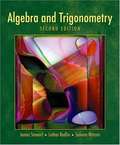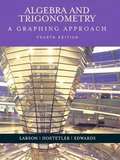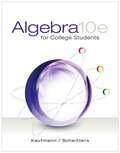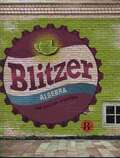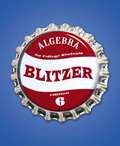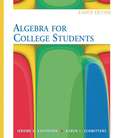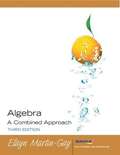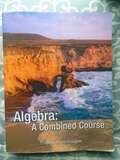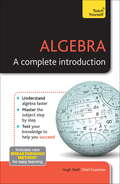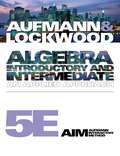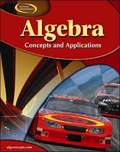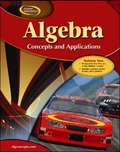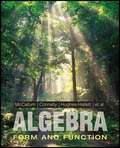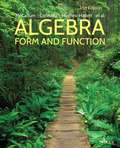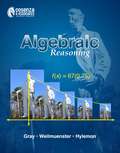- Table View
- List View
Algebra and Trigonometry
by Cynthia YoungCynthis Young's Algebra & Trigonometry, Fourth Edition will allow students to take the guesswork out of studying by providing them with a clear roadmap: what to do, how to do it, and whether they did it right, while seamlessly integrating to Young's learning content. Algebra & Trigonometry, Fourth Edition is written in a clear, single voice that speaks to students and mirrors how instructors communicate in lecture. Young's hallmark pedagogy enables students to become independent, successful learners. Varied exercise types and modeling projects keep the learning fresh and motivating. Algebra & Trigonometry 4e continues Young's tradition of fostering a love for succeeding in mathematics.
Algebra and Trigonometry
by Ron Larson David C. FalvoThis market-leading text continues to provide students and instructors with sound, consistently structured explanations of the mathematical concepts. Designed for a two-term course, the new Eighth Edition retains the features that have made Algebra and Trigonometry a complete solution for both students and instructors: interesting applications, cutting-edge design, and innovative technology combined with an abundance of carefully written exercises.
Algebra and Trigonometry
by Ron Larson David C. FalvoAs part of the market-leadingGraphing ApproachSeries by Larson, Hostetler, and Edwards,Algebra and Trigonometry: A Graphing Approach,4/e, provides both students and instructors with a sound mathematics course in an approachable, understandable format. The quality and quantity of the exercises, combined with interesting applications, cutting-edge design, and innovative resources, make teaching easier and help students succeed in mathematics. This edition, intended for algebra and trigonometry courses that require the use of a graphing calculator, includes a moderate review of algebra to help students entering the course with weak algebra skills. Accessibility to students is achieved through careful writing and design, including same-page examples and solutions, which maximize the readability of the text. Similarly, side-by-side solutions show algebraic, visual, and numeric representations of the mathematics to support students' various learning styles. TheLibrary of Functionsthread throughout the text provides a definition and list of characteristics for each elementary function and compares newly introduced functions to those already presented to increase students' understanding of these important concepts. Technology Supportnotes provided at point-of-use throughout the text guide students to theTechnology Support Appendix,where they can learn how to use specific graphing calculator features to enhance their understanding of the concepts presented. Houghton Mifflin'sEduspaceonline classroom management tool offers instructors the option to assign homework and tests online, provides tutorial support for students needing additional help, and includes the ability to grade any of these assignments automatically.
Algebra and Trigonometry: A Graphing Approach (4th edition)
by Ron Larson Bruce H. Edwards David C. Falvo Robert P. HostetlerAs part of the market-leading Graphing Approach series by Larson, Hostetler, and Edwards, Algebra and Trigonometry: A Graphing Approach, 4/e, provides both students and instructors with a sound mathematics course in an approachable, understandable format. The quality and quantity of the exercises, combined with interesting applications, cutting-edge design, and innovative resources, make teaching easier and help students succeed in mathematics. This edition, intended for algebra and trigonometry courses that require the use of a graphing calculator, includes a moderate review of algebra to help students entering the course with weak algebra skills.
Algebra and Trigonometry: Functions and Applications
by Paul A. FoersterAlgebra and Trigonometry--Functions and Applications is designed for a course in intermediate algebra, advanced algebra, and trigonometry. The book can be used in two different ways
Algebra and Trigonometry: Structure and Method
by Richard G. Brown Mary P. Dolciani Robert H. Sorgenfrey Robert B. KaneAlgebra for College Students
by Jerome E. Kaufmann Karen L. SchwittersKaufmann and Schwitters have built this text's reputation on clear and concise exposition, numerous examples, and plentiful problem sets. <p><p>This traditional text consistently reinforces the following common thread: learn a skill; practice the skill to help solve equations; and then apply what you have learned to solve application problems. This simple, straightforward approach has helped many students grasp and apply fundamental problem solving skills necessary for future mathematics courses. Algebraic ideas are developed in a logical sequence, and in an easy-to-read manner, without excessive vocabulary and formalism. <p><p>The open and uncluttered design helps keep students focused on the concepts while minimizing distractions. Problems and examples reference a broad range of topics, as well as career areas such as electronics, mechanics, and health, showing students that mathematics is part of everyday life. The text's resource package anchored by Enhanced WebAssign, an online homework management tool saves instructors time while also providing additional help and skill-building practice for students outside of class.
Algebra for College Students
by Robert BlitzerGets them engaged. Keeps them engaged. Bob Blitzer’s use of realistic applications instantly piques students’ curiosity about the presence of mathematical concepts in the world around them. These applications are apparent throughout the entire program–from his relatable examples, friendly writing style, and thought-provoking features in the textbook, to the enhanced digital resources in the MyMathLab course. Blitzer pulls from topics that are relevant to college students, often from pop culture and everyday life, to ensure that students will actually use their learning resources to achieve success. With an expansion of the series to now include a Developmental Math “all-in-one” text (with content spanning prealgebra through intermediate algebra), and with an enhanced media program accompanying this revision, developmental students at all levels will see how math applies to their daily lives and culture.
Algebra for College Students (4th Edition)
by Mark DugopolskiThe unifying theme of this text is the development of the skills necessary for solving equations and inequalities, followed by the application of those skills to solving applied problems. Every section ending in the text begins with six simple writing exercises. These exercises are designed to get students to review the definitions and rules of the section before doing more traditional exercises.
Algebra for College Students (Sixth Edition)
by Robert BlitzerAlgebra, in this book, is presented with utmost fun and thought-provoking applications, making it an interesting, friendly and engaging book for students.
Algebra for College Students, Eighth Edition
by Jerome E. Kaufmann Karen L. SchwittersMake math a snap with ALGEBRA FOR COLLEGE STUDENTS. Using everyday language and lots of examples, Kaufman and Schwitters show you how to apply algebra concepts and ace the test.
Algebra: A Combined Course: Concepts With Applications
by Charles P. McKeagueA Combined Course: Concepts With Applications
Algebra: A Complete Introduction (Teach Yourself)
by Hugh Neill P. AbbottAlgebra: A Complete Introduction is the most comprehensive yet easy-to-use introduction to using Algebra. Written by a leading expert, this book will help you if you are studying for an important exam or essay, or if you simply want to improve your knowledge. <P><P>The book covers all the key areas of algebra including elementary operations, linear equations, formulae, simultaneous equations, quadratic equations, logarithms, variation, laws and sequences.<P>Everything you will need is here in this one book. Each chapter includes not only an explanation of the knowledge and skills you need, but also worked examples and test questions.
Algebra: An Applied Approach, Fifth Edition
by Richard N. Aufmann Joanne S. LockwoodIn the fifth edition of Algebra: Introductory and Intermediate, the focus remains on the Aufmann Interactive Method (AIM), as in the previous editions. Students are encouraged to be active participants in the classroom and in their own studies as they work through the How To examples and the paired Examples and You Try It problems. All lessons, exercise sets, tests, and supplements are organized around a carefully constructed hierarchy of objectives. This "objective-based" approach not only serves the needs of students, in terms of helping them to clearly organize their thoughts around the content, but instructors as well, as they work to design syllabi, lesson plans, and other administrative documents.
Algebra: Concepts and Applications
by Glencoe McGraw-Hill StaffAn ideal program for struggling students Glencoe Algebra: Concepts and Applications covers all the Algebra 1 concepts. This program is designed for students who are challenged by high school mathematics.
Algebra: Concepts and Applications (Texas Edition)
by Carol Malloy Jack Price Jerry Cummins Kay Mcclain Yvonne MojicaGlencoe Algebra: Concepts and Applications includes lessons that will help students prepare for the Texas Essential Knowledge and Skills assessed on the Texas state test. This textbook contains a special section of practice problems specifically for the Texas state test.
Algebra: Concepts and Applications, Volume Two
by Carol Malloy Jack Price Jerry Cummins Kay Mcclain Yvonne MojicaAlgebra: Concepts & Applications, is a comprehensive Algebra 1 program that is available in full and two-volume editions. Algebra: Concepts & Applicationsuses a clean lesson design with many detailed examples and straightforward narration that make Algebra 1 topics inviting and Algebra 1 content understandable. Volume 1 contains Chapters 1-8 ofAlgebra: Concepts & Applicationsplus an initial section called Chapter A. Chapter A includes a pretest, lessonson prerequisite concepts, and a posttest. Designed for students who are challenged by high school mathematics, the 2007 edition has many new features and support components.
Algebra: Essentials and Applications
by Winston Holt RinehartAlgebra Essentials and Applications is focused, organized, and easy to follow. The program shows your students how to read, write, and understand the unique language of mathematics, so that they are prepared for every type of problem-solving and assessment situation.
Algebra: Form And Function
by Eric Connally Deborah Hughes-Hallett William G. MccallumThis book offers a fresh approach to algebra that focuses on teaching readers how to truly understand the principles, rather than viewing them merely as tools for other forms of mathematics. It relies on a storyline to form the backbone of the chapters and make the material more engaging. Conceptual exercise sets are included to show how the information is applied in the real world. Using symbolic notation as a framework, business professionals will come away with a vastly improved skill set.
Algebra: Form and Function (Second Edition)
by Eric Connally Elliot J. Marks Pat Shure Carl Swenson Deborah Hughes-Hallett Philip Cheifetz Ann Davidian Brigitte Lahme Patti Frazer Lock William G. Mccallum David Lovelock Ellen Schmierer Aysegul Sahin Adam H. Spiegler Selin KalaycýoðluAlgebra: Form and Function offers a fresh approach to algebra that focuses on teaching readers how to truly understand the principles, rather than viewing them merely as tools for other forms of mathematics. Meant for a College Algebra course, Algebra: Form and Function is an introduction to one of the fundamental aspects of modern society. Algebraic equations describe the laws of science, the principles of engineering, and the rules of business. The power of algebra lies in the efficient symbolic representation of complex ideas, which also presents the main difficulty in learning it. It is easy to forget the underlying structure of algebra and rely instead on a surface knowledge of algebraic manipulations. Most students rely on surface knowledge of algebraic manipulations without understanding the underlying structure of algebra that allows them to see patterns and apply it to multiple situations: McCallum focuses on the structure from the start.
Algebra: Structure and Method, Book 1
by Richard G. Brown Mary P. Dolciani Robert H. Sorgenfrey William L. ColeAlgebra, Structure and Method textbook for ninth grade students.
Algebraic Reasoning
by Paul Gray Jacqueline Weilmuenster Jennifer HylemonConsumable student worktext containing the Engage, Explore, and Explain sections of the Algebraic Reasoning textbook.
